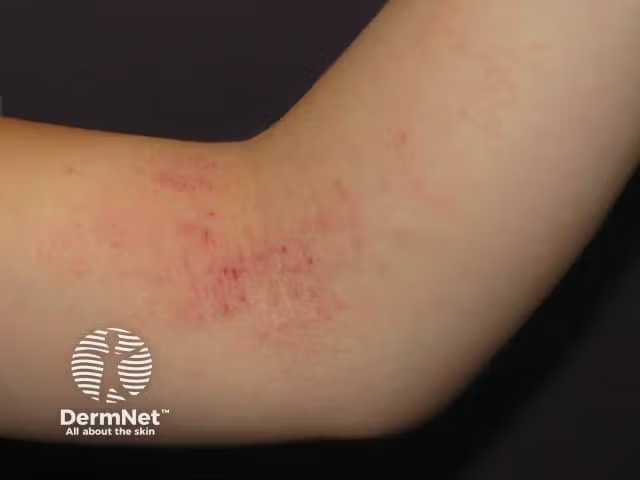- Case-Based Roundtable
- General Dermatology
- Eczema
- Chronic Hand Eczema
- Alopecia
- Aesthetics
- Vitiligo
- COVID-19
- Actinic Keratosis
- Precision Medicine and Biologics
- Rare Disease
- Wound Care
- Rosacea
- Psoriasis
- Psoriatic Arthritis
- Atopic Dermatitis
- Melasma
- NP and PA
- Skin Cancer
- Hidradenitis Suppurativa
- Drug Watch
- Pigmentary Disorders
- Acne
- Pediatric Dermatology
- Practice Management
- Prurigo Nodularis
- Buy-and-Bill
Video
Patient Case #1: 6-Year-Old Male Patient With Moderate AD
Author(s):
Expert dermatologists present and share initial impressions of a patient case for a 6-year-old male with AD, highlighting the impact of sleep deprivation.
Jonathan I Silverberg, MD, PhD, MPH: Let’s get started with our case presentation No. 1. We have a 6-year-old male previously diagnosed with moderate atopic dermatitis [AD], who was referred to a dermatologist with red, dry, itchy patches covering his neck and arms. Previous treatments were with nonpharmacologic products like emollients, moisturizers, and multiple topical corticosteroids. His parents noted that the rashes and itching have been getting worse for the past 1 year. Now, when talking with dermatologists, his parents mentioned disturbed sleep causing him to routinely miss preschool, which is a super common problem. The parents admitted to sometimes dressing him in long sleeved clothes, even on hot days, to prevent his peers and family from seeing scratches on his arms. A pretty common scenario, unfortunately. How would you all approach this patient from a high level, and then we can start drilling down into some of the different choices you would make regarding topicals and other things?
Elizabeth Swanson, MD: The impact on sleep is so important for all patients, but especially our little ones who have parents who are losing sleep too. I had a baby patient the other week who has been really struggling with atopic dermatitis, and the parents have been up all night every night, and they were complaining to the grandparents about it. And the grandparents said, “Oh, how bad could it be?” The grandparents said they would take the baby 1 night a week. After just doing that once, the grandparents said, “We have to fix this, this is awful.” If you disrupt a person’s sleep, it becomes priority No. 1 to fix that problem, especially in these young children where it’s affecting their sleep, learning, productivity, and then their parents too. I want to really get this under control quickly and efficiently and let them be better.
Jonathan I Silverberg, MD, PhD, MPH: We’re going to come back to how you would treat, but I want to get your impression of this as well. Any additional thoughts related to how you would think about this?
Brad Glick, DO, MPH, FAOCD: Really not, and I’ve got a pediatric dermatology expert next to me here. But I think it really is all about that itch because that itch is translating to sleeplessness, so it has to be managed. We can get into a discussion also about how one manages that sleeplessness. Obviously the idea is to fix the problem to reduce the itch, which hopefully reduces that sleeplessness. Sometimes we have challenges and maybe try some other things, even some antihistamines. We know that they don’t always necessarily work that great, but sometimes maybe those sedative effects will help at nighttime a bit because these poor children are miserable. Here’s a child who’s missing preschool because of this, and that’s tragic. I agree with Dr Swanson, I might add that 1 other thing as to how one might approach the sleep, and perhaps we even talk about that.
Jonathan I Silverberg, MD, PhD, MPH: I completely agree. Sleep is such an important construct, and of course, the broader symptoms. I would say we’re just starting to get a sense in the clinical research…we’ve known for the longest time that if the child doesn’t sleep, the family doesn’t sleep. I will say even for the adult patients, just as an analogue, it’s not just the parents of children. I’ll get this from adult patients, where I’ll ask the adult patient, “How are you sleeping?” They’re sleeping fine. Then the patient’s wife says, “He’s not sleeping fine, he’s elbowing me in the middle of the night.” The partner knows better sometimes than the patient. I want to switch gears a bit on this, how are you seeing the trial space evolving in terms of capturing some of the family impacts and burdens, or even some of these other downstream symptoms like sleep disturbance?
Andrew Blauvelt, MD, MBA: More and more we’re capturing it. To be honest with you, in the classic heyday of the psoriasis clinical trials I was always a pooh-pooher of the patient-reported outcomes. The reason was, they always followed the skin result. It’s logical, if the skin gets better in psoriasis, their quality of life gets better, their sleep, and everything. So why do we need all that? I’d say I’ve been a big believer now in patient-reported outcomes for atopic dermatitis studies because the skin improvement doesn’t always capture all these things we’re talking about, especially itch. Itch is such an important patient-reported outcome in trials. These days, even though I’m not practicing now, I am telling private practitioners every chance I get to please ask about itch, the itch-dominant type AD where you don’t see a lot, but the patients are itching like crazy. We have to be asking about itch, sleep, family disturbance, and school performance. It’s critical for AD, and in general, dermatologists do not spend enough time doing that.
Jonathan I Silverberg, MD, PhD, MPH: We get it, it’s busy. We’re running behind in the clinic, it’s easier to just look at the skin. But I think it is such an important message, we’ve got to ask and find out what their symptoms are. That bad itch alone can be a reason to step up to an advanced therapy altogether.
Transcript edited for clarity






